#prophet stories muhammad
Text
youtube
#quran#prophet adam story#english story#one islam#koran#abu bakr#first khalifah#caliphate#islamic story#caliph#prophet muhammad story#prophet muhammad death#prophet muhammad (saw)#history#islamic cartoons#prophet stories for kids#1st caliph#iqracartoon#prophet muhammad (s)#first caliph#prophet story#islamic history#prophet muhammad#yaqeen institute#muslim#victory#prophet stories muhammad#prophet's death#mecca#islam
1 note
·
View note
Text
youtube
#quran#prophet adam story#english story#one islam#koran#abu bakr#first khalifah#caliphate#islamic story#caliph#prophet muhammad story#prophet muhammad death#prophet muhammad (saw)#history#islamic cartoons#prophet stories for kids#1st caliph#iqracartoon#prophet muhammad (s)#first caliph#prophet story#islamic history#prophet muhammad#yaqeen institute#muslim#victory#prophet stories muhammad#prophet's death#mecca#islam
0 notes
Text
“Whatever our souls are made of, his and mine are the same.”
- Emily Brontë.
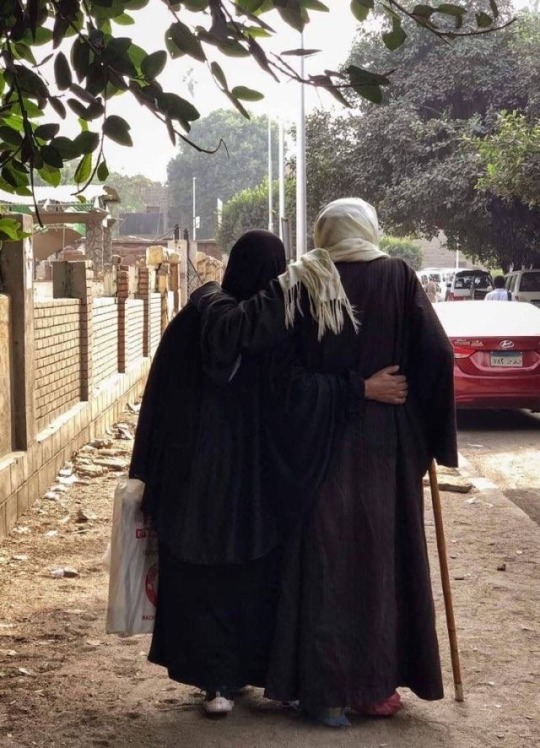

#islampost#islamquotes#islamic#lovers#loveislove#my love#couple#muslimcouples#love story#halal love#alhamdulillah#allahuakbar#muslim#allahisthegreatest#prophet muhammad#duaa#photooftheday#viralpost#explore#likeforfollow#500 likes
68 notes
·
View notes
Text
The Prophet cared for and valued the pain of a little child who was grieving over the loss of his little bird.
Anas b. Malik said:
The Messenger of Allah used to come to visit us. I had a younger brother who was called Abu ‘Umair’ (nickname). He had a sparrow with which he played, but it died. So one day the prophet came to see him and saw him grieved. He asked: What is the matter with him? The people replied: His sparrow has died. He then said: Abu ‘Umair! What has happened to the little sparrow? [Sunan Abi Dawud]
The Prophet (saw) didn’t say “brush it off, young man. Toughen up and move on. There are much bigger problems in life.”
Rather, the Prophet took the time to listen and validate the feelings of the little child, engage with him and console him mercifully. This is the mercy of the Messenger of The Most Merciful, imagine the mercy of the Most Merciful Himself!
Every small moment of pain you go through is seen and heard by Allah and is rewarded by Him. Be it a harsh word you read in an email, a tough meeting that left you uncomfortable or an unpleasant manager who keeps you on your toes, stressed and unable to enjoy life… All of those moments can be rewarded and they also happen for a greater reason.
2 notes
·
View notes
Text
Unearth the Night of Power: 5 Authentic Signs of Laylatul Qadr Revealed!
Can we see Laylatul Qadr?
Laylatul Qadr could also be seen with the attention, for the one whom Allah helps to see it. That’s by seeing its indicators. The Sahabah (could Allah be happy with them) used to acknowledge it by its indicators. However not seeing them doesn’t imply that one won’t achieve its reward, if one spends that night time in prayer out of religion and the hope of reward.…

View On WordPress
#5 Authentic Signs of Laylatul-Qadr#Laylat-ul-Qadr#Laylatul Qadr#laylatul qadr benefits#laylatul qadr story#Night of Power#Prophet Muhammad#Ramadan#ramadan 2024#when is the night of power#why is laylat al-qadr important
0 notes
Link
0 notes
Text
in case anyone is interested in learning some stories about islam
some background, in Islam, there are lots of different prophets and they were blessed with special gifts. the prophets all had friends that are called companions and they're collectively considered the best of humanity.
during the days of Hazrat Sulaiman (King Solomon), his people were walking through an area but he heard an ant say to its fellow ants to hurry into the colony so they don't get trampled and Sulaiman stopped to pray and thank god that he could do righteous things like being mindful of the life around him
the last prophet, who's also the most famous and considered the best of humanity, Hazrat Muhammad, had a cat named Muezza who he loved so much he didn't mind drinking water that Muezza stuck his face in
Hazrat Muhammad loved Muezza so much that when he was called to prayer and Muezza was sitting on his sleeve, he chose to cut off his sleeve rather than disturb Muezza
there was a woman who used to throw garbage on Hazrat Muhammad every time he had to walk by her house on his way but one day she didn't so he knocked and went into her house and saw that she was sick so he nursed her back to health
Hazrat Muhammad called his younger cousin Ali, Abu Turab, or Father of Dirt because he fell asleep in a mosque absolutely COVERED in dirt
on the way to Makkah (where Hazrat Muhammad was born and basically abused and thrown out of when he became a prophet, he was coming back to claim it in peace) there was a dog and her puppies in the path that his army had to walk through so the prophet gave the dog family their own guard to keep them safe while they walked through
Hazrat Muhammad, again, the single most important human being in Islam, was praying with his head to the ground (prostrating) and his grandkids climbed on to his back so he just stayed there until they had their fun and got off and then continued his prayer
there's a lot of poetic justice on the day of judgement so people who were arrogant are turned into ants, people who masturbated will have pregnant hands, real creative stuff
there was a battle of trenches where the Muslims dag hide trenches to protect their one exposed side and without resources like water and food, to suppress hunger, the diggers would tied a stone to their stomach and pressure would make them feel less hungry. they went to complain to the Hazrat Muhammad that it wasn't fair. when they reached him where he was digging in a different part, he just lifted his shirt to show them that he had two stones tied to his stomach too.
once Hazrat Muhammad was sleeping at his companions house and early morning on Eid (think Christmas level celebration) the companion's daughters were singing while the prophet was asleep. his companion was telling his daughters to quiet down because he, the most important person, was sleeping and the prophet wakes from his sleep to basically say it's Eid. it's a day to celebrate. let them sing even if it disrupts my sleep.
Khalid bin Walid, one of the companions was so fucking sick, he was called the sword of god and during one of his battles he broke nine swords. he broke nine swords. he was also ambidextrous and fought with two swords.
disclaimer: I am not a religious scholar, I just know some things. For reference, I was born, raised and schooled in Islam for a really long time. I am not a Muslim, so please feel free to correct me or add on any religious stories from any religion.
#islam#religious stuff#actually traumatized#muhammad#prophet mohammed#stories#quran#learn something new every day#i may not be a believer anymore but we stan Muezza#swords#cats#prayer
0 notes
Text
https://wordofprophet.com/story-of-prophet-sheeth-in-islam/
Story of Prophet Sheeth in Islam
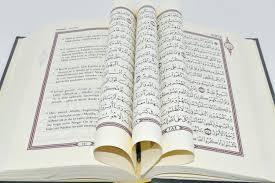
In Islam, Prophet Sheeth (also known as Seth in some Judeo-Christian traditions) is considered to be a prophet and the son of Prophet Adam and Eve. His story is not extensively detailed in Islamic scriptures like the Quran, and much of what is known about him is derived from Islamic tradition.
Prophet Sheeth is believed to have been chosen by Allah to continue the lineage of prophethood after the death of his father, Prophet Adam. He was known for his righteousness and piety, and he taught the monotheistic message of Islam to his people, emphasizing the worship of the one true God, Allah.
Prophet Sheeth's main role was to guide his community in adhering to the teachings of Islam and living a righteous life. While the Quran does not provide many specifics about his life and mission, he is recognized as one of the many prophets sent by Allah to guide humanity on the path of righteousness and monotheism.
Read his story.
1 note
·
View note
Link
Shab e Miraj is a beautiful story which is a night journey from Mecca to Masjid al-Aqsa and Jannat which is tried be told in this video which is according to the detail of Hadith o Aalim if there is any mistake so please Forgive your brother for being a learner. Please watch the full video and tell your thoughts through comments and share and like as much as possible. Thank you.:)
#shabemeraj#shabmeraj#meraj#isra miraj#Miraj#prophet muhammad#storytelling#story#Islamic Stories#islamism#Sufism
1 note
·
View note
Text
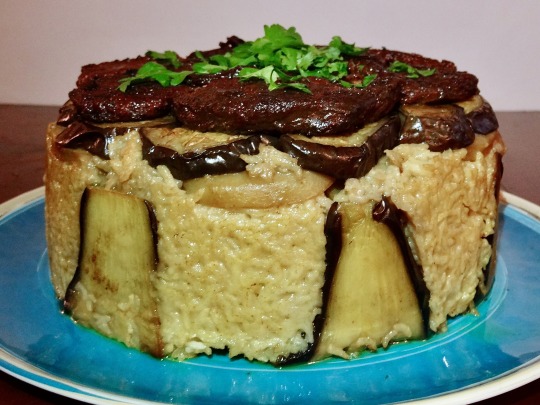
[ID: A wide cylindrical pile of rice, eggplants, and 'lamb' on a serving platter, garnished with parsley. End ID]
مقلوبة / Maqluba
مَقْلُوبَة ("maqlūba," "upside down" or "turned over") is a Levantine casserole in which spiced meat, fried vegetables, and rice are arranged in a pot and simmered; the entire pot is then inverted onto a serving tray to reveal the layered ingredients. Maqluba historically uses lamb and eggplant, but modern recipes more often call for chicken; tomato, cauliflower, potato, bell pepper, and peas are other relatively recent additions to the repertoire.
A well-made maqluba should be aromatic and highly spiced; the meat and vegetables should be very tender; and the rice should be cohesive without being mushy. A side of yoghurt gives a tangy, creamy lift that cuts through and complements the spice and fat in the dish.
Maqluba emphasizes communal eating and presentation. It is usually eaten during gatherings and special occasions, especially during Ramadan—a month of sunrise-to-sunset fasting which celebrates the revelation of the Qu'ran to the prophet Mohammad. The pot is sometimes flipped over at the table for a dramatic reveal.
History
Many sources cite Muhammad bin Hasan al-Baghdadi's 1226 Kitāb al-ṭabīkh (كتاب الطبيخ لمحمد بن حسن البغدادي) as containing the first known reference to maqluba. However, the recipes for "maqluba" in this book are actually for small, pan-fried patties of spiced ground meat. [1] The dish is presumably titled "maqluba" because, once one side is fried, the cook is instructed to turn the patties over ("أقلب الوجه الآخر") to brown the other; the identical name to the modern dish is thus coincidental.
References to dishes more like modern maqluba occur elsewhere. A type of مغمومة ("maghmūma," "covered" dish), consisting of layers of meat, eggplant, and rice, covered with flatbread, cooked and then inverted onto a serving plate, is described in a 9th-century poem by إبراهيم بن المهدي (Ibrāhīm ibn al-Mahdī):
A layer of meat underneath of which lies a layer of its own fat, and another of sweet onion, another of rice,
Another of peeled eggplant slices, each looking like a good dirham honestly earned. [...]
Thus layered the pot is brought to a boil first then enclosed with a disc of oven bread.
On the glowing fire it is then put, thus giving it what it needs of heat and fat.
When fully cooked and its fat is well up, turn it over onto a platter, big and wide. (trans. Nawal Nasrallah) [2]
These sources are both Iraqi, but one story holds that maqluba originated in Jerusalem. صلاح الدين الأيوبي (Ṣalāḥ ad-Dīn al-Ayyūbi; "Saladin"), after capturing the city from the Crusaders and reinstating Muslim rule in 1187, was served the dish, and was the first to describe it with its current name. Before this point, the Jerusalem specialty had supposedly been known as "باذنجانية" ("bāḏinjānīyya"), from "باذنجان" "bāḏinjān" "eggplant" + ية- "-iyya," a noun-forming suffix.
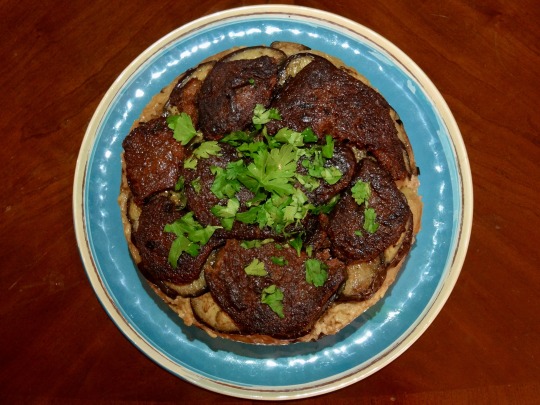
[ID: The same dish shown from directly above. End ID]
In Palestine
Maqluba is often invoked in the context of Palestinian strength and resistance, in defiance of its occasional description as an "Israeli" dish. Palestinian magazine writer Aleeya Rizvi reflects:
In the wake of the recent [2023] war in Gaza, our culinary endeavors, particularly in crafting and sharing traditional Palestinian dishes like Maqluba, represent a conscious effort to contribute to the preservation and resilience of Palestinian culture. In a time when cultural heritage is under threat, preparing and enjoying these time-honored recipes becomes more than a mere culinary activity; it transforms into a deliberate act of cultural continuity and solidarity.
Maqluba also has a more specific association with physical resistance against the backdrop of increased settler and police violence against Palestinians, including regular Israeli raids and attacks on the جامع الأقصى ("Jāmi' al-Aqṣā"; al-Aqsa mosque), during Ramadan.
The holiest month in the Islamic calendar, Ramadan is given over to fasting, prayer, and reflection; people gather together in homes and mosques to break their fast after sunset, and spend entire nights in mosques in worship. Khadija Khwais and Hanady Al-Halawani used to serve maqluba for افطار ("ifṭār," fast-breaking meal) in the Al-Aqsa mosque, until Israeli occupation authorities banned them from the mosque for "incitement."
In response, starting in 2015, Al-Halawani and other volunteer مرابطين ("murābiṭīn," lit. "holy people," guardians of the mosque) stationed themselves on the ground outside the mosque's gate (باب السلسلة; Bāb as-Silsila, "chain gate") to prepare and serve maqluba. Those who were banned from entering the mosque broke their fast and prayed at the mosque's gates, and in the nearby alleys of the Old City. The same year saw Israeli security personnel and settlers attack Palestinian protestors and guardians outside and inside the mosque with tear gas and stun grenades.
For Al-Halawani, the serving of maqluba at the al-Aqsa gates symbolizes "defiance, steadfastness, and insistence on continuing the fast [...] in spite of the occupation’s practices." The "Maqluba at al-Aqsa" ritual "has become one of the most disturbing Palestinian scenes for the occupation forces," who associate it with the defense of "Palestinian heritage" and the intent to "motivate worshipers and murabitin to repel incursions into the mosque." (Al-Halawani has been arrested, threatened, beaten, and detained by Israeli police multiple times for her role as a defender of Al-Aqsa. She was among the prisoners freed in trades between Israel and Hamas in December 2023.)
In 2017, occupation forces installed metal detectors, electronic gates, metal barriers, and police cameras to surveil worshipers following a shoot-out at one of al Aqsa's gates. Hundreds of protesters refused to enter the mosque until the repressive measures were removed, instead gathering and praying in its courtyard; surrounding families bolstered the sit-ins by serving food and drink. When the gates were dismantled, over 50,000 people gathered to eat maqluba in celebration, picking up on the earlier association of the dish with Saladin's victory (and its resultant alternate name, "أكلة النصر," "ʔakla an-naṣr," "victory meal").
The name "maqluba," meaning "upside-down" or "inverted," may be associated with victory and resistance as well. Fatema Khader noted in 2023 that the method of serving maqluba was a "symbolic representation of how Israeli policies and decisions against Palestinians will be flipped on their heads and become rendered meaningless." It is also relevant that maqluba is meant to be served to large groups of people, and can thus be linked, symbolically and literally, to solidarity and communal resistance.
This year in Gaza, Palestinians show steadfast optimism as they paint murals, hang lanterns, buy sweets, hold parties, and pray in groups amongst the rubble where mosques once stood. But despite these efforts at creating joy, the dire circumstances take heavy tolls, and the holiday cannot be celebrated as usual: Israel's campaign of slow starvation led Ghazzawi Diab al-Zaza to comment, "We have been fasting almost against our will for three months".
Donate to provide hot meals in Gaza for Ramadan
[1] Also reprinted in Mosul: Umm Al-Rubi'in Press (مطبعة ام الربيعين) (1934), p. 57. For an English translation see Charles Perry, A Baghdad Cookery Book (2005), pp. 77-8.
[2] This poem, as well as one of Ibn al-Mahdi's maghmuma dishes, were compiled in Ibn Sayyar al-Warraq's 10th-century Book of Dishes (كتاب الطبيخ وإصلاح الأغذية المأكولات وطيّبات الأطعمة المصنو; "Kitāb al-ṭabīkh waʔiṣlāḥ al-ʔaghdiyat al-maʔkūlāt waṭayyibāt ʔaṭ'ima al-maṣno," "Book of cookery, food reform, delicacies, and prepared foods"), p. 99 recto. For Nasrallah's English translation see Annals of the Caliph's Kitchens, pp. 313-4.
In the 14th-century Andalusian Cookbook (كتاب الطبيخ في المغرب والأندلس في عصر الموحدين، للمكلف المجهول; "Kitāb al-ṭabīkh fī al-Maghrib wa al-Andalus fī ʻaṣr al-Mawahḥidīn," "Book of cookery from the Maghreb and Andalusia in the era of Almohads"), a maghmuma recipe appears as "لون مغموم لابن المهدى", "maghmum by Ibn al-Mahdi". For an English translation see An Anonymous Andalusian Cookbook, trans. Perry et al.
Ingredients:
For a 6-qt stockpot. Serves 12.
For the meat:
1 recipe seitan lamb
or
2 cups (330g) ground beef substitute
1 cinnamon stick
1 bay laurel leaf
Pinch ground cardamom
Several cracks black pepper
For the dish:
3 cups (600g) Egyptian rice
2 medium-sized globe eggplants
2 large Yukon gold potatoes (optional)
Vegetarian 'chicken' or 'beef' bouillon cube (optional)
2 1/2 tsp table salt (1 1/2 tsp, if using bouillon)
Vegetable oil, to deep-fry
Fried pine nuts or sliced blanched almonds, to top
Egyptian rice is the traditional choice in this dish, but many modern recipes use basmati.
I kept my ingredients list fairly simple, but you can also consider adding cauliflower, carrots, peas, chickpeas, zucchini, bell pepper, and/or tomato to preference (especially if omitting meat substitutes).
For the spices:
1 1/2 Tbsp maqluba spices
or
1 4" piece (3g) cinnamon bark, toasted and ground (1 1/2 tsp ground cinnamon)
3/4 tsp (2.2g) ground turmeric
3/4 tsp (1.5g) cloves, toasted and ground
3/4 tsp (2.2g) black peppercorns, toasted and ground
15 green cardamom pods (4.5g), toasted, seeds removed, and ground (or 3/4 tsp ground cardamom)
Instructions:
For the meat:
1. Prepare the seitan lamb, if using: it will need to be started several hours early, or the night before.
2. If using ground meat: heat 2 tsp oil in a skillet on medium. Add cinnamon stick and bay leaf and fry for 30 seconds until fragrant.
3. Add meat and ground spices and fry, agitating occasionally, until browned. Set aside.
For the dish:
2. Rinse rice 2 to 3 times, until water runs almost clear. Soak in cold water for 30 minutes, while you prepare the vegetables.
3. Optional: to achieve a presentation with eggplant on the sides of the maqluba, remove the skin from either side of one eggplant (so that all slices have flesh exposed on both sides) and then cut lengthwise into 1/2" (1cm)-thick slices.
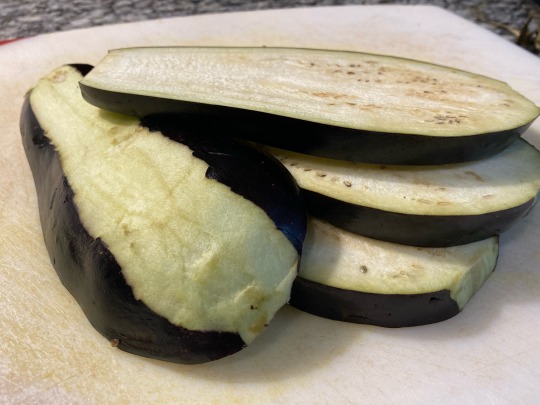
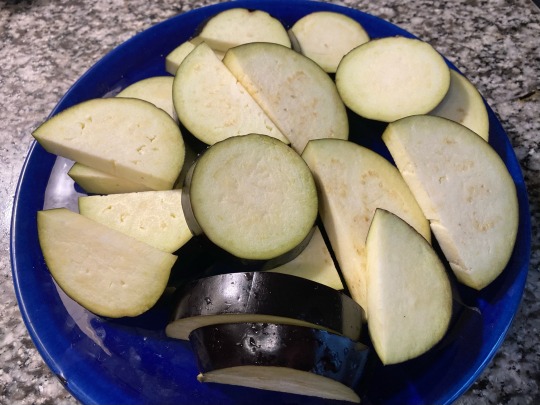
Cut the other eggplant (or both eggplants) widthwise into coins and half-coins.
4. Sprinkle eggplant slices with salt on both sides and leave for 10-15 minutes to release water.
5. Peel potatoes and cut in 1/4" (1/2 cm) slices.
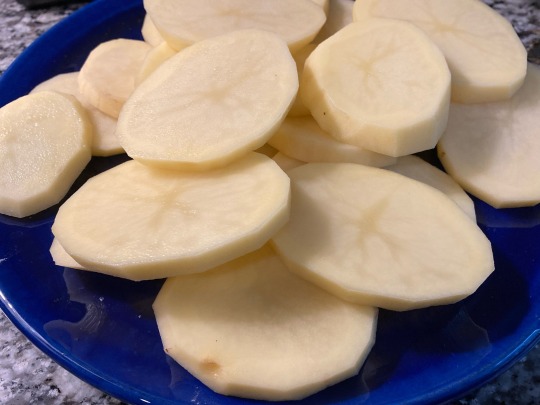
6. Heat about an inch of oil in a deep skillet or wok on medium (a potato slice dropped in should immediately form bubbles). Fry the potato slices until golden brown, then remove onto a paper-towel-lined plate or wire cooling rack.
7. Press eggplant slices on both sides with a towel to remove moisture. Fry in the same oil until translucent and golden brown, then remove as before.
Fry other vegetables (except for tomato, chickpeas, and peas) the same way, if using.
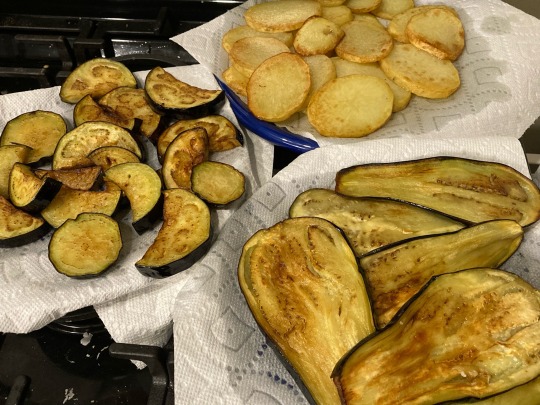
8. Drain rice. Whisk bouillon, salt, and ground spices into several cups of hot water.
9. Prepare a large, thick-bottomed pot with a circle of oiled parchment paper (or with a layer of sliced tomatoes). Add ground meat, if using. Layer widthwise-sliced eggplants into the pot, followed by potatoes. Place longitudinally sliced eggplants around the sides of the pot, large side up.
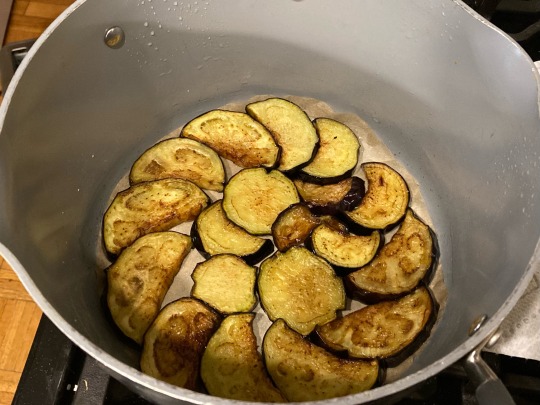
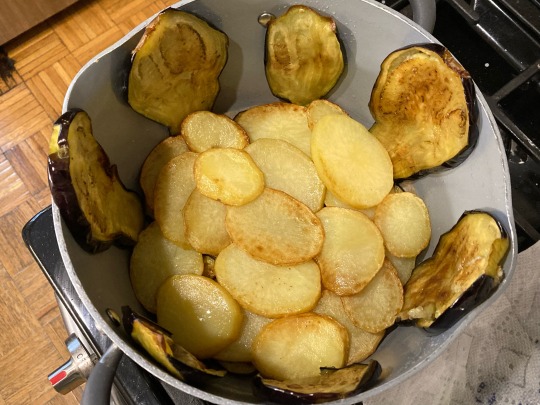
10. Add rice and pack in. Fold eggplant slices down over the rice, if they protrude.
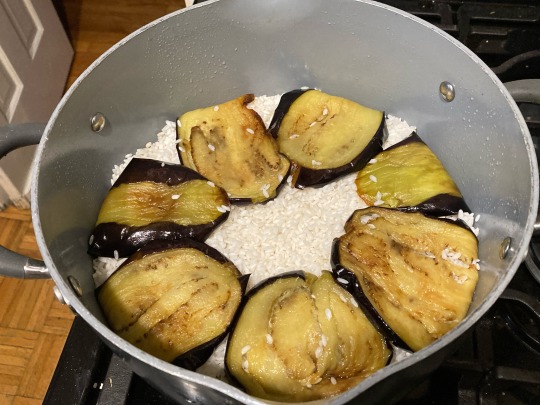
11. Pour broth into the pot, being careful not to upset the rice. Add more water if necessary, so that the rice is covered by about an inch.
12. Heat on medium to bring to a boil. Reduce heat to low, cover with a closely fitting lid, and cook 30 minutes.
13. If rice is not fully cooked after 30 minutes, lightly stir and add another cup of water. Re-cover and cook another 15 minutes. Check again and repeat as necessary.
14. Allow maqluba to rest for half an hour before flipping for best results. Place a large platter upside-down over the mouth of the pot, then flip both over in one smooth motion. Tap the bottom of the pot to release, and leave for a few minutes to allow the maqluba to drop.
15. Slowly lift the pot straight up, rotating slightly if the sides seem stuck.
16. Top with fried seitan lamb, chopped parsley, and fried pine nuts or almonds, as desired.
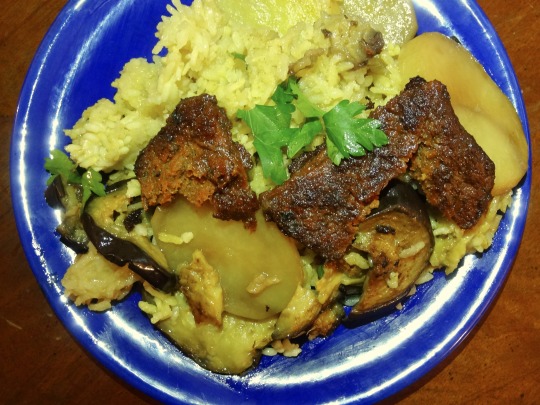
359 notes
·
View notes
Link
0 notes
Text

#clashes#muslims#hajj#kashmir#mosque#masjid#islamic knowledge#islamabad#muslim#quran#quranquotes#islamic lecture#prophet muhammad#allah#islam#islamic stories
1 note
·
View note
Note
During ancient times there was the kingdoms of Judah and Israel. But according to the Tanakh (Hebrew Bible) there was also the United Kingdom of Israel. BUT the thing is that a lot of ancient history about Jews is written in the Tanakh. And you can never really 100% trust religious books as historical sources. The Tanakh was written on stuff that can actually be preserved. While possible other sources on history of the Jews and other groups were written on things that perished. There is a lot of debate about the extent of the United Kingdom of Israel or that it even existed.
You have two kinds of historians when it comes to the Hebrew Bible:
The maximalists: accept everything unless proven incorrect by outside sources. https://en.wikipedia.org/wiki/Biblical_maximalism
The minimalists: Hebrew Bible is limited in historical value. https://en.wikipedia.org/wiki/Biblical_minimalism
Thanks so much for these links actually while looking at "biblical minimalism" I recognize some of the authors being cited in some of the works I read. I should check them out.
Also love reading academic beef the way that both groups named each other's "study" but neither operates with those labels lmaooo classic academics.
But also so people don't misunderstand me or try to take me out of context regarding this whole discussion: I also don't think the Quran is a 100% accurate historically, and it's stories are mostly used to educate on certain topics and ideas as it's primary purpose (think of aesop fables when i say this). Of course religiously I believe in the Quran, but most of the Quran is written in poetic verses in arabic and even as a baseline Muslims believe there's more to a quranic translation than just the direct translation. In quranic book history what we focus on a lot is the way books were made throughout history moreso than the actual contents (which religiously, we are not supposed to change at all... I believe the Hebrew Bible also is like that? Would love if someone could tell me more about it tho).
Even with the Birmingham Quran (the oldest quran that has been carbondated to around the time of Prophet Muhammad), i dont think its as important for the text itself (other than comparing contemporary and ancient to see if any changes happened through the few leaflets that survived), the most valuable parts of it is the fact we can carbon date it and see what sorts of materials they used back then and to see when the earliest surviving fragments came from. Plus we can analyze the script and rubrication to see if this was actually used to be read or used as a mnemonic device.
I can't say too much about archeological study more than this and that other post though. That's not exactly my field of interest or expertise. If people want to share more I can't provide much input unless you're talking about book history LOL.
But yeah just wanted to clarify so people don't assume bad faith/try to use my words to push their own agendas. In general historical studies should separate themselves from religion I feel if they go beyond analyzing societies the time in which the books/material were made or written.
Also here's a direct link to Birmingham Quran if the above one doesn't link:
54 notes
·
View notes
Text
Last notes and final thoughts on Creating the Quran:
A text does not become fixed at its first writing; ancient and especially sacred writing remain open and in flux for a considerable period after. Even after it was written down, the Quran was a text "in process."
The rasm (the consonantal "skeleton" of the Quran) does show extraordinary constancy from the time of Abd al-Malik; its vocalization was in dispute for centuries after. But the tremendous fluidity of the oral phase of development did come to an end.
Lol, the name of a scholar cited in this chapter is "Assmann."
Oral tradition can coexist with a written canon for a time: even once the Gospels had been written down, ancient writers rarely cited them word-for-word, often using relatively free transmissions and maintaining the vibracy of oral tradition. A similar process may have been at work around the Quran.
Sometimes searching for an "original text" when it comes to texts like these (including the Gospels, for instance, or the books of the Hebrew Bible) may even be meaningless; the early text-forms are in dialogue with the late oral-forms, and the former are not being produced with the specific end of creating a fixed, canonical text. Concepts like individual authorship, a complete and self-contained textual artifact, and formal publication don't necessarily apply. Canonized texts can start out as essentially aids to memory, or personal notes, that existed to be revised and extended as necessary.
The early regional codices could have grown out of such memoranda, only gradually being reshaped into more complete and polished texts. This would help account for why the Quran often repeats the same tradition in different forms, sometimes with minor differences and sometimes with significant contraditions.
For works like the Gospels, Matthew and Mark might have even been regarded as functionally "the same text" in the same way even very different oral performances of a story can be considered "the same."
The evident parallel traditions in the Quran may derive from the retelling and recomposition of traditions in different communities, or from ongoing revisions to an open text. Many of these parallel traditions are Christian ones, or Jewish ones that seemed to enter the text from Christian sources.
Extensive biographical tradition within Islam around Muhammad in particular; but it's unlikely (for reasons discussed earlier) to be reliable. The small grains of historicity within it are obscured by the narrative that has grown around them.
Some traditions in the Quran appear to originate from before Muhammad's prophetic mission, distinguished by their utter lack of intelligibility for early Muslim commentators. This indicates they were not passed down orally, since they were not altered in ways to make them relevant to the community, and so may have been written down when Muhammad and his earliest followers encountered them.
Bellamy argues there are more than two hundred words in the Quran that later commentators not only didn't understand, but didn't know how to vocalize. These could be the result of copyists' mistakes, but they're present in all Quran manuscripts, and so would have to go back to a single version.
Example: "Yuhanna" ("John") being read as "Yahya," because of the ambiguity between and without consonant-pointing. With just the rasm, Yahya is a perfectly good guess--whoever first read "Yahya" in the passages where it occurs cannot have had an oral tradition preserving the sound of the name, or prior knowledge of John the Baptist, or they would have recognized it on the basis of context.
Surat Quraysh was very opaque to interpreters, who had no better understanding of this sura than we do today; the meaning of the key term "ilaf" seems to be entirely opaque, leading to a wide array of interpretations. Difficult to reconcile this lack of understanding with Muhammad teaching it to his followers.
Final editing of the Quran must have been very conservative to retain these infelicities--typical of scriptural traditions, or at least of the Hebrew Bible and New Testament.
Patricia Crone proposes some parts of the Quran predate Muhammad. Michael Cook says OTOH maybe the materials that make up the Quran didn't become "generally available as scripture" until well after Muhammad's death. Neither supposition is exclusive of the other.
Gerd Puin argues that "every fifth sentence" or so "simply doesn't make sense." Gerald Hawting observes "the text taken on its own is often completely unintelligible, filled with grammatical and logical discontinuities." This puts me in mind with the weird way different sources are jammed together in the Hebrew Bible, sometimes totally muddling narratives that were clear in the original--I don't wonder if part of the problem is that different regional codices, when brought together, were harmonized in a very conservative way that left a lot of contraditions and discontinuities in the text.
Shoemaker thinks the best model is still the one where the Quran is largely rooted in Muhammad's teachings, with the inclusion possibly of some archaic and imperfectly understood textual materials, and with considerable change introduced in the process of transmission before final canonization.
Quran talks about seafaring and fishing familiarly, both things alien to Mecca and Yathrib. Ditto agriculture and vegetation, especially kinds not found even in the Yathrib oasis. Most likely elements that found their way in once the Islamic polity had reached the shores of the Mediterranean.
Similarly out of place geographical references: Sodom and Gomorrah as places passed by daily; as the audience living not far from where Lot once dwelled. Landscape of memory here is focused on Palestine, not Hijaz.
Heavy borrowing of words, including from Syriac and Hebrew, in the language of the Quran, indicating heavy linguistic contact with the Fertile Crescent.
"Vast knowledge of Christian lore" despite no Christian presence in Mecca or Yathrib, in either the Islamic tradition or elsewhere. Quran assumes good knowledge of the Torah and Gospels and many extrabiblical traditions also. The Quran's presentation of many figures from the Hebrew Bible draws specifically on Syriac Christian traditions, and not on Jewish traditions as you might suppose from the traditional account of Jews present in Medina. Its anti-Jewish rhetoric and demonology depend on earlier Christian traditions, and some passages seem to address Christian directly.
Removing Muhammad and the Quran completely from the Hijaz would make it hard to explain why Mecca and Yathrib eventually came to be so important in later tradition. It seems likely that, even though the Holy Land and Jerusalem stood at the center of the imagination of early believers, there was some historical connection to the Hijaz, and only as they began to more self-consciously differentiate themselves from Christians and Jews around them did they shift their focus to this element of their history.
It's not necessary (or tenable) to entirely detach the Quran from the figure of Muhammad. Some material in it almost certainly derives from his prophetic career in Mecca and Medina. In some cases, followers later added blocks of textual material already written down in a religious context somewhere outside the Hijaz, alongside entirely new traditions emerging from cross-cultural contact.
19:22-28 gives a compressed account of the Nativity that is found only in the liturgical practice of a particular Marian shrine just outside Jerusalem, the Kathisma church. This tradition is so obscure it's unlikely it independently made its way to the central Hijaz--it joined the corpus most likely after Muhammad's followers took control of the region, and converted this church into a mosque.
Like almost all other sacred texts of its type, the Quran is not a "book" but a corpus: texts not originally intended to be grouped together, heterogenous in origin and function, and in some cases dependent or independent of one another. Composite, but also composed, i.e., put together intentionally and carefully using techniques from a literate context, with literary polish.
70 notes
·
View notes
Text
When will the help of Allah arrive?
The revelation of Surah Al-Ankabut occurred when Muslims faced severe oppression. Once Prophet Muhammad (peace be upon him) began preaching Islam publicly, his few followers quickly found that professing faith meant facing ruthless torture and execution. Men from the Mecca like Abu Bakr (ra), were beaten unconscious in the streets, while slaves like Bilal b. Rabah (ra) and Suhayb b. Sinân (ra) were shackled and left to scorch in the midday desert sun.
The conditions had become extremely unfavorable, and a noble companion was tortured with burning coals without clothes. They took him to hot, open areas in the city when the sun was very strong. It was scorching on the ground. They removed his clothes, put iron armor on him, and laid him on the hot ground. Because of the intense heat, his skin would burn, and his body would become still. His skin melted due to the extreme conditions, and he went to Prophet Muhammad (peace be upon him), asking, "Why isn't Allah's help coming, considering what we are going through?"
Then, the verses of Surah Al-Ankabut were revealed. When Surah Al-Ankabut was revealed, its initial verses emphasized patience. The first verses addressed the companions, saying, “Do people think once they say, “We believe,” that they will be left without being put to the test? We certainly tested those before them. And ˹in this way˺ Allah will clearly distinguish between those who are truthful and those who are liars.”
After this, the mention of Prophet Noah began, highlighting that he had to endure centuries of waiting, and eventually, Allah's help came through the flood. After that, the mention of Prophet Abrahim followed, who faced difficulties from his own people and was saved from the fire.
Then the story of Prophet Lut is mentioned. Prophet Lut was also supposed to migrate. However, at that point, the command for migration had not yet been given. Prophet Lut would be questioning when the command would come and when they would leave this place.
After a long period of patience, finally, the angels came, and the command for migration was given.
Allah, through these stories, was conveying to Prophet Muhammad (peace be upon him) that just as He helped all those previous prophets, He would help them too. However, they needed to be patient and wait, just as all of them had to wait.
This Surah gives us hope that help would surely come, and it would come in a way one cannot anticipate. All we have to do is wait patiently.
#allah#islamdaily#quran#ayah from quran#lessons from quran#islam#islamicreminder#motivating quotes#prophetsaw#islamicquotes#islampost#islamicreminders#islamic quotes#deen daily#deenislam#palestine
65 notes
·
View notes
Note
hey rem, I’m just curious, no judging—what’s the reason you left your religion? I found that you’ve been struggling more since you started to lose your faith, so I just wondered what made you take that decision?
Well, since you asked so kindly
I left my religion slowly, over a long time, for a lot of reasons.
The easiest one that most people accept is that I do t like Islam’s treatment of queer people, since being queer is a huge part of my identity and people are usually ready to accept that answer.
But it is not so cut and dry
The reason is that I do not believe in the concept of an all-powerful, all-knowing, and completely passionate and caring deity that presides over the universe.
If Allah exists, then he allowed a five year old child to be groomed and abused, by a man that styles himself as an Islamic Scholar, for almost nine years. He allowed that trauma to happen and allowed that man to die before he could face any justice for his crimes.
And for what? Because it’s part of his plan? If an omniscient and omnipotent being needs an innocent child to suffer like that for his plan to come to fruition, he is either not as compassionate as he claims or not as powerful as he claims.
People will tell me that he will burn in Jahannam for eternity for his crimes, but why was the crime allowed to happen at all?
Do you know why Muslims pray five times a day? The Quran tells the story, saying that on the night of Al Isra wal Miraj, the Prophet Muhammad (pbuh) ascended to Jannat (heaven) and was able to speak to Allah, who told him that every Muslim was to pray to him 50 times a day. He accepted, and as he descended through the layers of heaven, the prophet Musa (Moses, peace be upon him) told him to go back up and negotiate it lower. 50 to 45 to 40 and so on until it went to 5. That’s why there are five daily prayers.
What sort of God is so egotistical that he needs every single believer to pray to him 50 times a day to prove they love him? If he is all knowing, why start with 50 and not just command it be 5? Why do you need 5 at all? Why do you need people to constantly tell you that they love you?
I have my own religious trauma, from things taught in classes to the fucking pedophile calling himself a priest who came to my home 90 minutes a day 6 days a week for 8 and a half years, who was too religious to celebrate a birthday or let anyone else do so but apparently not enough to avoid abusing children
There are many arguments to be made about why I dislike Islam, most of them can be boiled down to something someone or the other will argue to be “misinterpretations of the text” or “a cultural thing” or “personal choice”
But in the end, at my core, I do not believe in the concept of a perfect, unerring God. The “Perfect” god of Islamic and Christian faith, insofar as I have seen, has allowed untold carnage, depraved abuse, and unspeakable violence to occur with the promise that one day, if you’re good, if you follow the rules, and pray every day, things will eventually, some day, somehow, turn out fine.
I respect Muslims. I respect Christians. I respect every single religion and every person of faith because I believe they all want to be good and do good because I think that is the nature of humanity. Who they choose to attribute that good to is none of my concern. I believe that everyone is human before they are their religion. Neither goodness nor badness can be attributed to a religion. They all have supremacists and extremists and people that will give their lives away trying to do good and make the world a better place. But if a god comes and declares that they are responsible for all of that, including the bad, and are just letting it happen for “divine purpose”? I reserve the right to question that.
And for the record, sweetheart, I am not suffering more since I’ve left my religion. I’ve been suffering the same for a very long time, and it’s only now that I’m in college, away from home, that I’m getting the space to process all of it. And sometimes things have to get worse before they get better. Right now it’s just worse than usual because the holiest month of the Islamic year is about to start, and it is always tough on me.
31 notes
·
View notes